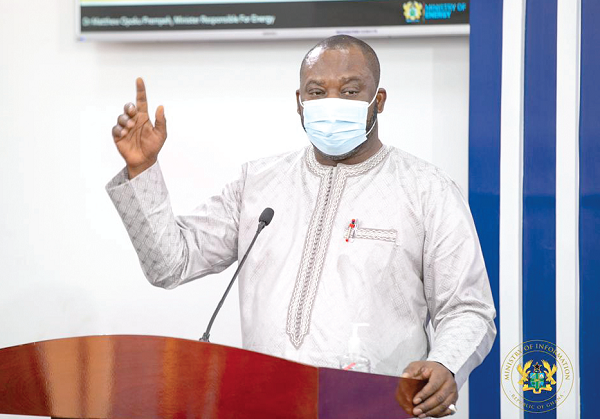
Graduated electricity tariff not industry-friendly— Energy Minister
The Minister of Energy, Dr Matthew Opoku Prempeh, has described the current graduated electricity tariffs system as punitive, and therefore does not encourage small-scale industries to use energy to increase production for industrial growth, employment generation and wealth creation.
He said in order to address the current punitive system where consumers that use more paid more per the same unit, the ministry had taken advantage of the Energy Sector Recovery Taskforce under a World Bank programme and had engaged the PURC to address the situation.
Advertisement
Dr Prempeh, flanked by a Deputy Minister for Energy designate, Mr Andrew Agyapa Mercer, was speaking at the Nation Builder’s Update, a press conference by the Ministry of Information for ministries and agencies to brief Ghanaians about current development.
It was on the theme: “Let’s Fix Together & Win”.
“We should know the cry of Ghanaians is to get good jobs, and these are created by small and medium-scale industries so we need to give them electricity at a tariff that is both affordable and reliable for them”, the minister noted.
He gave an analogy of where consumers at fuel stations paid the same amount for every litre irrespective of the quantity purchased but when it came to electricity, those who used the power for industrial growth, among others, paid more.
Ongoing Works
On the upgrading of the electricity system, Dr Prempeh stated that the government’s decision to fix the worn-out systems and the new policies for the energy sector were geared towards making it financially viable, sustainable and place it on a pedestal to provide reliable and affordable energy.
He said those included constantly retooling and fixing the age-old systems, engaging in activities such as moving from the use of expensive fuel to less expensive gas, and renegotiating the terms of both independent power producers and power purchasing agreements.
Dr Prempeh assured Ghanaians, especially those experiencing the planned outages, to be patient because the problems were being resolved.
Underinvestment
He said the power value chain had suffered from chronic underinvestment over the years while demand from the sector had shot up leading to myriad of problems in the sector which the Akufo-Addo government started sorting out from 2017.
He noted that: “We are working to upgrade the infrastructure to ensure that the systems are able to accommodate the load being transmitted,” and mentioned that with the ongoing works meant to upgrade the system, almost all would be completed by the end of the year.
Works
He explained that the Pokuase Bulk supply station was 95 per cent complete and would be finished and inaugurated by July this year, the Kasoa Bulk Supply Point was 60 per cent complete and that the Kumasi to Kintampo transmission lines was 75 per cent complete.
He added that because the Bui Dam water level was very low and affecting power generation, the government would move the Ameri Plant to the Ashanti Region to generate power in the middle and northern belts and also to cater for the gap in the 330 KV National Transmission Backbone from Kumasi to Kintampo. Besides it was working on the complete upgrade of 161 KV to 330 KV from Kumasi to Kintampo.
“What it meant is that with increasing population we have been transmitting on the same lines that we have had in the 1950s and 1960s, meaning there is congestion and failures on the lines with some insulators splitting up because of heat while some of the lines gave in with transformers catching fire,” he added.
Prices
He said during the 2006 to 2008 power outages, the government solved the problem by using its own resources to buy generators, and fuelled it without any increased tariffs but during the 2012 to 2016 outages, the government signed power purchasing agreements for generating plants at a very high cost while at the same time increasing the tariffs for the Ghanaian.
He said put together the NPP government had increased electricity tariffs by (negative) -2.8 per cent from 2017 to 2020 while the NDC increased it by 288 per cent between 2013 and 2016 because the Akufo-Addo government resorted to prudent management of the sector.
Deferred
He said when the NPP assumed power it realised that the then government had signed power purchasing agreements on a take or pay basis, although some of the plants had not been deployed so the government decided to renegotiate to defer three sets and that saved Ghana $ 1.42 billion.




